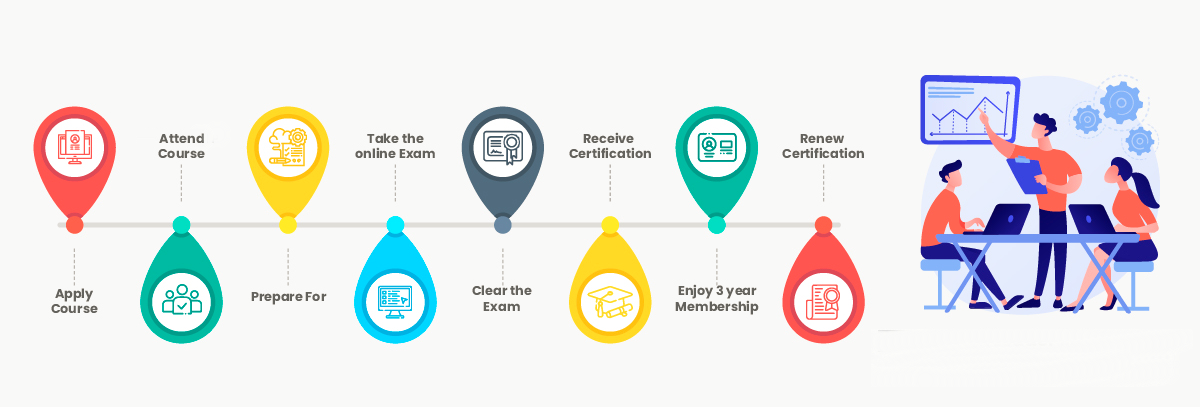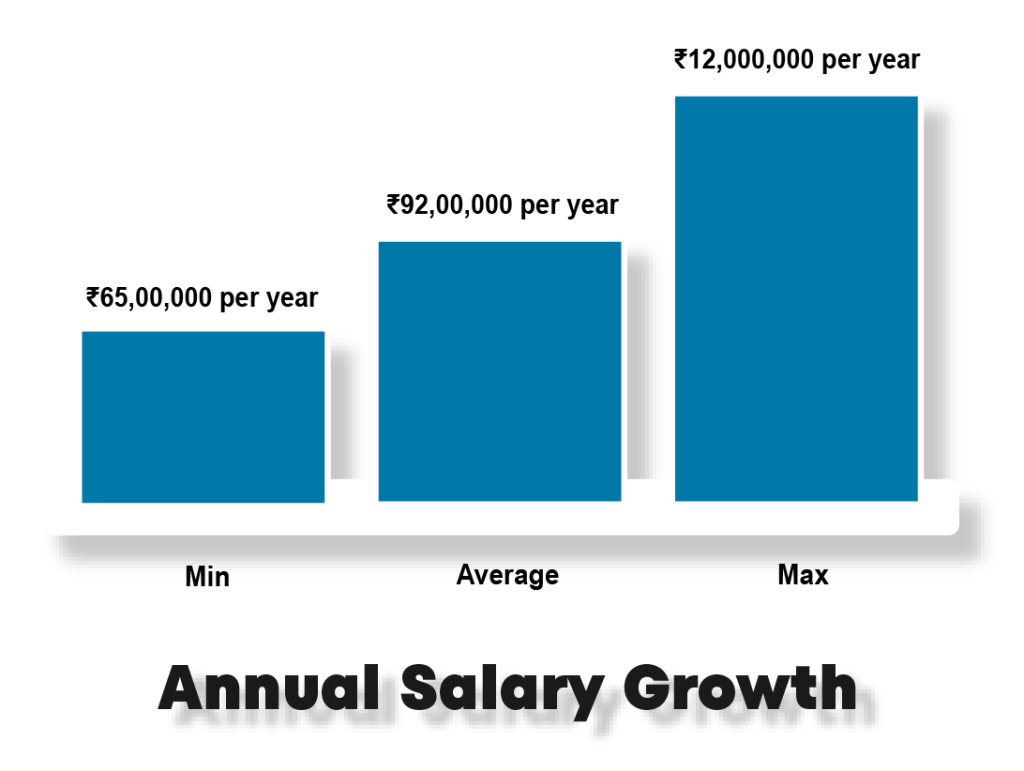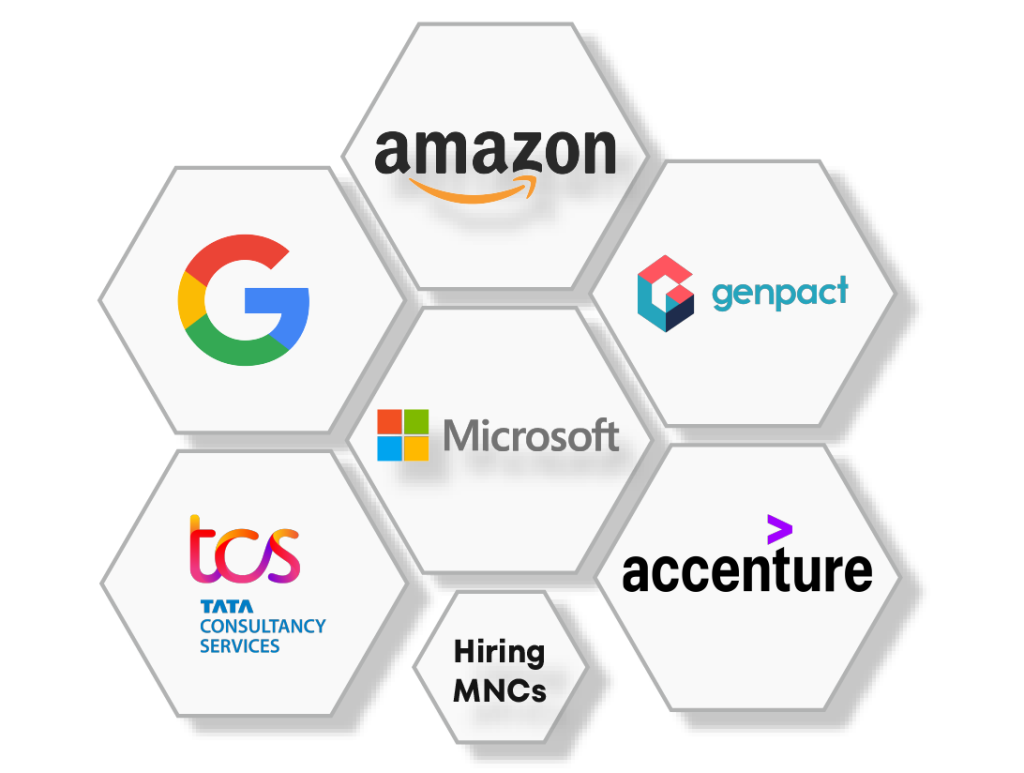
The Education Nest Data Science with Python Training program provides a comprehensive understanding of the core concepts of data science and analytical techniques using the Python language. Our training is specifically designed to enhance your skills and make you proficient in working with various data science packages in Python, such as Numpy, Matplotlib, Pandas, Scikit, deep learning algorithms, machine learning model evaluation, data visualization, statistical data analysis techniques, and more. Through practical projects and use cases, you will have the opportunity to apply these concepts and tools effectively, enabling you to become an expert in this field. This course is an excellent starting point for those looking to launch their careers in the rapidly growing domain of data science.
Application Deadline: May 31st, 2023
Upskill for Your Dream Job
The Python-based Data Science Training program offered by Sambodhi and Education Nest is designed to equip you with a comprehensive understanding of key data science concepts and analytical techniques. The program aims to enhance your proficiency in working with various data science packages, including Numpy, Matplotlib, Pandas, Scikit, and deep learning algorithms, as well as statistical data analysis techniques and data visualization. With the help of practical projects and use cases, you will have the opportunity to apply these tools effectively, making you an expert in this field. This course is an excellent starting point for those seeking to launch their careers in the rapidly growing domain of data science.



Instructor-led Data Science with Python live online Training Schedule
May 27th – Weekend
July 1st – Weekend
Why enroll for Data Science with Python Certificate Training Course?

According to the U.S. Bureau of Labor Statistics, there will be around 11.5 million new jobs for Data Science professionals by 2026.

Python is popular in data science due to its ease of use, flexibility, and extensive libraries. It's used in healthcare, finance, retail, marketing, energy, transportation, education, and government.

The average salary for a data scientist with Python programming skills ranges from around $80,000 to $150,000 per year, depending on the level of experience.

Data Science With Python Training Course Benefits
The US Bureau of Labour Statistics projects that employment of computer and information research scientists, which includes Data Scientists, is expected to grow by 16% from 2020 to 2030. Candidates who possess Data Science knowledge and Python programming skills are presented with vast opportunities to pursue their desired career in Data Science. Sambodhi and Education Nest’s Data Science with Python course is designed to teach the fundamental concepts from the ground up and equip you with the necessary skills to kick-start your career in this domain.

Annual Salary

Hiring Companies
Want to become a Data Science With Python
Professional?
Why Data Science with Python Certificate Training Course from Education Nest






Data Science With Python Skills Covered
Data Science With Python Training Course Syllabus
Data Science With Python Training Projects

Data Science With Python projects for the IT industry may include developing predictive models for customer segmentation, fraud detection, and churn analysis. Natural Language Processing (NLP) can be used to develop chatbots or sentiment analysis tools. Recommender systems can be built for personalized product recommendations. Data visualization techniques can be applied to create interactive dashboards for monitoring key performance indicators. Image recognition and object detection models can be developed for various applications such as facial recognition or automated quality control in manufacturing. These projects can help organizations in the IT industry to make data-driven decisions, optimize processes, and enhance customer experience.

In the retail industry, some of the projects that can be undertaken using Data Science with Python include customer segmentation to identify profitable customer groups, predicting customer churn to prevent loss of revenue, analyzing sales data to identify trends and improve inventory management, and using recommender systems to personalize product recommendations and improve customer engagement. Other potential projects include analyzing customer feedback data to improve product offerings and customer experience, and using predictive analytics to forecast sales and optimize pricing strategies. These projects can help retailers make data-driven decisions, enhance customer experience, and drive business growth.
Data Science With Python Training Description
The Data Science With Python course provides a comprehensive understanding of key data science concepts and analytical techniques using the Python language. Students will learn to work with various data science packages such as Numpy, Pandas, Scikit, and deep learning algorithms, as well as data visualization and statistical data analysis techniques. The course includes practical projects and use cases to apply these tools effectively and enhance proficiency in the field. The program is an excellent starting point for launching a career in the rapidly growing domain of data science.
Upon finishing this training, you will have the ability to:
Learning Data Science with Python provides several advantages, including:
Data Science with Python course can be beneficial for a wide range of individuals who work with data in any capacity. Here are some examples:
Overall, anyone who works with data, whether for personal or professional purposes, can benefit from Data Science with Python course.
The pre-requisites for the Data Science With Python course are a basic understanding of programming concepts such as loops, functions, and conditional statements. Some familiarity with statistics, linear algebra, and calculus will also be helpful. However, the course is designed to cater to beginners as well, so no prior experience with Python or data science is required.
Other Courses offered by Sambodhi and Education Nest for Data Science is:
Each of this software has its own unique features and strengths, and the choice of software depends on the specific needs and requirements of the project.
The Data Science With Python course provides a comprehensive understanding of key data science concepts and analytical techniques using the Python language. Students will learn to work with various data science packages such as Numpy, Pandas, Scikit, and deep learning algorithms, as well as data visualization and statistical data analysis techniques. The course includes practical projects and use cases to apply these tools effectively and enhance proficiency in the field. The program is an excellent starting point for launching a career in the rapidly growing domain of data science.
Upon finishing this training, you will have the ability to:
Learning Data Science with Python provides several advantages, including:
Data Science with Python course can be beneficial for a wide range of individuals who work with data in any capacity. Here are some examples:
Overall, anyone who works with data, whether for personal or professional purposes, can benefit from Data Science with Python course.
The pre-requisites for the Data Science With Python course are a basic understanding of programming concepts such as loops, functions, and conditional statements. Some familiarity with statistics, linear algebra, and calculus will also be helpful. However, the course is designed to cater to beginners as well, so no prior experience with Python or data science is required.
Other Courses offered by Sambodhi and Education Nest for Data Science is:
Each of this software has its own unique features and strengths, and the choice of software depends on the specific needs and requirements of the project.
Data Science With Python Certificate Training Course reviews
Read learner testimonials
Sarah Johnson
The Data Science with Python course offered by Sambodhi and Education Nest is well-structured, comprehensive, and covers a range of topics. The instructors are knowledgeable and engaging, and the practical projects and use cases provided help learners apply concepts effectively. Overall, a great learning experience!
Rohit Patel
Data Science with Python is a comprehensive program covering core concepts and analytical techniques of data science. It involves the use of Python and various packages, including Numpy, Pandas, Matplotlib, and Scikit-learn, to learn machine learning algorithms, data visualization, and statistical analysis techniques.
Saibal Chatterjee
I recently completed the Data Science with Python course offered by Sambodhi and Education Nest, and I was extremely impressed with the quality of instruction and materials provided. The trainers were knowledgeable and engaging, and their practical approach to teaching made it easy to understand complex concepts.
Hear from our learners
Lorem ipsum dolor sit amet, consectetur adipiscing elit. Ut elit tellus, luctus nec ullamcorper mattis, pulvinar dapibus leo.
Lorem ipsum dolor sit amet, consectetur adipiscing elit. Ut elit tellus, luctus nec ullamcorper mattis, pulvinar dapibus leo.
Lorem ipsum dolor sit amet, consectetur adipiscing elit. Ut elit tellus, luctus nec ullamcorper mattis, pulvinar dapibus leo.
Like what you hear from our learners?
Creating Epic Presentations: Communicating Powerful Ideas reviews
Data Science With Python Training FAQs
If you miss an online Data Science With Python class, it’s important to reach out to the instructor or the support team of the online training platform you are using. They may be able to provide you with a recording or transcript of the missed class, so that you can catch up on what you missed. Alternatively, some platforms offer on-demand access to class materials, so you can go back and review the content on your own time. It’s always a good idea to try and make up the missed material as soon as possible, so that you don’t fall behind in your learning.
If you have queries after completing an online Data Science With Python course, Education Nest training platforms offer some form of post-course support. This may include access to a dedicated support team, a community forum where you can ask questions and connect with other learners, or even one-on-one sessions with an instructor or coach.
If you have specific questions or concerns related to the course material, you can reach out to the instructor directly or use the support channels provided by the platform. It’s always a good idea to clarify any doubts or questions you may have, as this will help to solidify your understanding of the material and ensure that you can apply what you’ve learned in a real-world context.
Data Science with Python is a comprehensive training program that provides a thorough understanding of core concepts, analytical techniques, and tools used in data science using the Python programming language. The course covers various data science packages, including Numpy, Pandas, Matplotlib, Scikit-learn, machine learning algorithms, data visualization, and statistical data analysis techniques.
The timing of when you get access to learning content after signing up for an online Data Science With Python course will depend on the specific training platform you are using.
In most cases, you should receive access to the learning content immediately upon signing up, or shortly after your payment has been processed. Some platforms may require you to complete an enrolment process or set up an account before you can access the content.
It’s always a good idea to check the specific details of the course or platform you are using, as the timing and process may vary. If you are experiencing any issues accessing the learning content, you should contact the support team of the training platform for assistance.
Once you enrol in a Data Science With Python Training course, you will typically have access to the course material for as long as the course remains available on the platform. This means that you can revisit the material at any time, even after you have completed the course, and continue to learn and improve your skills.
The benefit of lifetime access to the learning material is that it allows you to learn at your own pace and on your own schedule. You can review the content as many times as you need to fully understand the concepts and techniques covered in the course. Additionally, if you encounter a new challenge in your work or personal life, you can go back to the course material to find solutions and strategies to help you overcome the challenge.
Having access to course material for a lifetime is a valuable benefit, as it allows you to continue to improve your skills and knowledge long after you have completed the course. So, if you are interested in improving your Python skills and want the flexibility to learn at your own pace, consider enrolling in an Data Science With Python Training course that offers lifetime access to the learning material.
If you miss an online Data Science With Python class, it’s important to reach out to the instructor or the support team of the online training platform you are using. They may be able to provide you with a recording or transcript of the missed class, so that you can catch up on what you missed. Alternatively, some platforms offer on-demand access to class materials, so you can go back and review the content on your own time. It’s always a good idea to try and make up the missed material as soon as possible, so that you don’t fall behind in your learning.
If you have queries after completing an online Data Science With Python course, Education Nest training platforms offer some form of post-course support. This may include access to a dedicated support team, a community forum where you can ask questions and connect with other learners, or even one-on-one sessions with an instructor or coach.
If you have specific questions or concerns related to the course material, you can reach out to the instructor directly or use the support channels provided by the platform. It’s always a good idea to clarify any doubts or questions you may have, as this will help to solidify your understanding of the material and ensure that you can apply what you’ve learned in a real-world context.
Data Science with Python is a comprehensive training program that provides a thorough understanding of core concepts, analytical techniques, and tools used in data science using the Python programming language. The course covers various data science packages, including Numpy, Pandas, Matplotlib, Scikit-learn, machine learning algorithms, data visualization, and statistical data analysis techniques.
The timing of when you get access to learning content after signing up for an online Data Science With Python course will depend on the specific training platform you are using.
In most cases, you should receive access to the learning content immediately upon signing up, or shortly after your payment has been processed. Some platforms may require you to complete an enrolment process or set up an account before you can access the content.
It’s always a good idea to check the specific details of the course or platform you are using, as the timing and process may vary. If you are experiencing any issues accessing the learning content, you should contact the support team of the training platform for assistance.
Once you enrol in a Data Science With Python Training course, you will typically have access to the course material for as long as the course remains available on the platform. This means that you can revisit the material at any time, even after you have completed the course, and continue to learn and improve your skills.
The benefit of lifetime access to the learning material is that it allows you to learn at your own pace and on your own schedule. You can review the content as many times as you need to fully understand the concepts and techniques covered in the course. Additionally, if you encounter a new challenge in your work or personal life, you can go back to the course material to find solutions and strategies to help you overcome the challenge.
Having access to course material for a lifetime is a valuable benefit, as it allows you to continue to improve your skills and knowledge long after you have completed the course. So, if you are interested in improving your Python skills and want the flexibility to learn at your own pace, consider enrolling in an Data Science With Python Training course that offers lifetime access to the learning material.
Be future ready, start learning